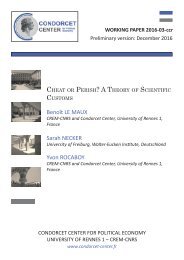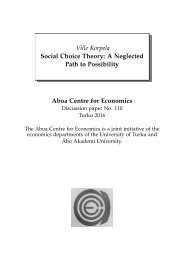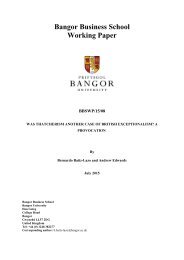MEMORANDUM
n?u=RePEc:hhs:osloec:2016_018&r=hpe
n?u=RePEc:hhs:osloec:2016_018&r=hpe
Create successful ePaper yourself
Turn your PDF publications into a flip-book with our unique Google optimized e-Paper software.
in 1925, or, for that matter, Germany for USA in 1931. Other choices would have led him<br />
onto different paths but surely paths that would have served to release the great talent<br />
Wassily Leontief had for analyzing social and economic phenomena combining theory,<br />
mathematical tools, and his firm conviction that scholars needed to have direct and firm<br />
knowledge of the data providing underpinning of their theories.<br />
Leontief’s interest in empirical applications and his hands on approach to data<br />
handling is not at variance with Robert Solow’s characterization of him as “first and<br />
foremost a theorist” (Solow 1998, p.299). His general modus operandi or research<br />
strategy which can be discerned already in the late 1920s distinguished him from many<br />
other scholars. A characteristic feature of Leontief as a scholar was his insistence on the<br />
empirical relevance of economic research. At the same time he insisted on the preeminence<br />
of theory; any empirical investigation had to guided by theory, economic data<br />
should be compiled and analyzed within a theoretical framework. It was required that the<br />
researcher should acquire a very thorough knowledge of the empirical realities as if he was<br />
literally wading through the masses of data.<br />
Leontief was one of the charter members of the Econometric Society (founded 1930),<br />
the main objective of which was “…to promote studies that aim at a unification of the<br />
theoretical-quantitative and the empirical-quantitative approach to economic problems and<br />
that are penetrated by constructive and rigorous thinking similar to that which has come to<br />
dominate in the natural sciences.” 5 The formulation appealed to Leontief since he first read<br />
it in 1930.<br />
Leontief’s view on the role of theory in the use of economic data was stated in a<br />
hidden away passage in one of his key papers:<br />
“The most elaborate statistical investigation furnishes nothing but shapeless heaps<br />
of raw material, utterly useless unless fitted into a firm theoretical framework”<br />
(Leontief 1937, p.131).<br />
The passage mirrored a statement by Ragnar Frisch a few years earlier: “The material<br />
under observation is and remains a dead mass until it is animated by constructive<br />
theoretical speculation.” 6 Similar views were shared among several of the early<br />
econometricians.<br />
On various occasions Leontief spoke out on such matters and voiced opposition to<br />
prevailing views and practices. He was utterly opposed to a strict division of labor between<br />
on the one hand theoreticians constructing models and on the other researchers who<br />
5 Constitution, Econometrica 1, Jan. 1933, p.106.<br />
6 Frisch (1931, p.282; transl. by ob).<br />
5





